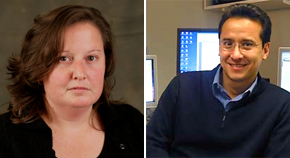Genomics Expert, Microbiologist Join NEIDL
New researchers specialize in henipavirus, TB

The Boston University Medical Center’s National Emerging Infectious Diseases Laboratories (NEIDL) have added two more members to its team of infectious disease experts. Katharine Bossart, a microbiologist specializing in emerging and reemerging viruses, and James Galagan, a leader in genomics and computational biology, joined the NEIDL faculty this past summer.
The NEIDL is being built with a grant from the National Institutes of Health and will enable researchers to study dangerous infectious diseases that occur naturally or that could be introduced through bioterrorism. The goal of its research is to develop novel diagnostic tests, treatments, and vaccines. Study of the most serious infectious microorganisms will take place in NEIDL’s biosafety level 4 lab. (Laboratories are required to meet one of four safety levels; level 4 is the highest, used to contain potentially life-threatening microorganisms.)
Construction of the facility is scheduled to be completed this year, but research will not begin until a comprehensive environmental risk assessment is completed. A Blue Ribbon Panel of experts appointed by the National Institutes of Health has been meeting since March in response to a National Academy of Sciences concern that an earlier risk assessment conducted by the NIH did not adequately identify worst-case scenarios.
Bossart, a School of Medicine research assistant professor of microbiology, spent the past four years working at the National Australian Animal Health Laboratory, a subsidiary of the Commonwealth Scientific and Industrial Research Organisation, in Victoria, Australia. Her research focused on rapid identification of viruses during disease outbreaks in humans and animals, with emphasis on foot-and-mouth disease virus (FMDV) as well as flaviviruses including Dengue virus, West Nile virus, and Japanese encephalitis virus.
Another aspect of Bossart’s work centers around two unusual BSL-4 paramyxoviruses, Hendra and Nipah, which can infect animals and transmit disease to humans. Her research into these viruses began nearly a decade ago at the Uniformed Services University of the Health Sciences in Bethesda, Md., where she developed potent antivirals that prevented virus entry into host cells and engineered a potential vaccine. Moreover, she developed sensitive serological tests for differentiating between the Hendra and the Nipah viruses.
“By working within the biosafety level 4 facility at the NEIDL, I can continue my work evaluating therapeutic agents and vaccines” Bossart says. “Additionally, in collaboration with an international team of scientists, we are using our new serological tests to better define henipavirus exposure rates in humans and animals in different regions of the world.”
As associate director of the Systems Biology of Infectious Diseases Core at the NEIDL, Galagan will focus his research primarily on the bacterium that causes tuberculosis. By studying the interactions of the bacteria’s genes, proteins, and metabolites, he hopes to create a more precise understanding of TB behavior, which may ultimately help in developing new drugs, vaccines, or therapeutics. The research will be funded by a three-year $750,000 New Faculty Startup Grant from the Massachusetts Life Sciences Center, a quasi-public agency whose purpose is to attract and retain top-notch scientific talent to Massachusetts.
“I’ll be taking a combined genomic and computational approach to try and understand the pathophysiology of tuberculosis at a molecular level,” Galagan says. “By taking a systems biology approach to TB, we hope to reconstruct the molecular circuitry of the bacterium that causes this disease.”
Galagan, a School of Engineering assistant professor of biomedical engineering and a MED assistant professor of microbiology, says he is particularly excited to work in the NEIDL’s biosafety level 4 lab. “There are only a limited number of labs in the world with this sort of capability,” he says, “and being part of such a lab is tremendously exciting for the scientific opportunities it affords.”
“As we complete construction of the NEIDL, it’s exciting to bring in new faculty whose research efforts will determine how successful we are in fulfilling our mission of preventing and curing emerging infectious diseases,” says Mark Klempner, NEIDL director, Medical Campus associate provost for research, and a MED professor. “It is gratifying that so many outstanding scientists, like Katherine Bossart and James Galagan, want to be part of this enterprise.”
Vicky Waltz can be reached at vwaltz@bu.edu.
Comments & Discussion
Boston University moderates comments to facilitate an informed, substantive, civil conversation. Abusive, profane, self-promotional, misleading, incoherent or off-topic comments will be rejected. Moderators are staffed during regular business hours (EST) and can only accept comments written in English. Statistics or facts must include a citation or a link to the citation.